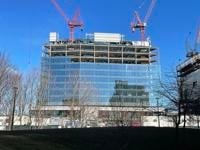
Arlington, Newton May Join “Leafy Green Suburbs” In Major Experiment
By Chris Lisinski, State House News Service. Originally Posted on the State House News Service on January 4, 2024
After years of deliberations, negotiations and regulatory rollout — and some well-publicized “agita” in the corner office — a septet of Massachusetts cities and towns can now significantly limit the use of fossil fuels in building projects.
The Department of Energy Resources gave seven communities the final green light to begin a groundbreaking experiment: they will require new construction and major renovation to embrace fossil fuel-free infrastructure for uses like heating and cooling.
Acton, Aquinnah, Brookline, Cambridge, Concord, Lincoln and Lexington can now begin enforcing those policies, effectively mandating that most construction or significant renovation projects inside their borders abstain from oil and gas hookups.
Effective dates vary by community. In several cases, the landmark bylaws will take effect within three months, though Lincoln’s will not kick in until six months after DOER’s approval and Aquinnah’s appears to have already started on Jan. 1.
The bylaws themselves also have a few variations across cities and towns, carving out localized exceptions like allowing continued fossil fuel use in restaurant kitchens.
Another two communities, Arlington and Newton, won “conditional project acceptance” from the state. They each have until Feb. 11, 2024 to prove they fulfilled affordable housing requirements in the law creating the pilot program.
“This is a huge milestone,” said Lisa Cunningham, co-founder of the ZeroCarbonMA advocacy group. “I hope it’s only the beginning of a sea change in the way we think about building, not just in Massachusetts but throughout the country.”
The Healey administration did not publicly tout the formal go-ahead notice that DOER issued to communities on Dec. 22. A DOER official confirmed the approvals on Thursday following a News Service inquiry and said it had not been announced earlier due to the holiday season.
Buildings are responsible for about 35 percent of greenhouse gas emissions in Massachusetts, making them the second-largest source behind the transportation sector, according to the Healey administration’s climate report card.
State law set a target of achieving net-zero emissions by 2050 and a series of escalating targets in the interim, and policymakers will need to substantially rein in sources of carbon to do so.
Although the program is limited to just a handful of cities and towns, its supporters argue that it will kick off a necessary shift away from fossil fuel infrastructure in buildings across the Bay State. Cunningham said use of those fuel sources needs to stop “immediately” if policymakers want to “stop digging the hole deeper.”
“This [program] still gets at just the tip of the iceberg because we’re talking new or significantly new construction,” she said. “We now have to look to decarbonizing our built environment and our existing buildings.”
The nine communities moving forward with local restrictions on fossil fuels in construction are part of a “demonstration program” lawmakers created in a 2022 climate and clean energy bill. Then-Gov. Charlie Baker initially voiced concerns about the idea leading to exclusionary zoning, saying the proposal “gives me agita,” before ultimately giving his approval.
The program has 10 slots. Original applicant West Tisbury withdrew after its leaders said they would not be able to meet the affordable housing eligibility requirements.
Each participant must have at least 10 percent of their housing stock affordable under Chapter 40B, secure safe harbor status through a state-certified Housing Production Plan, or approve a zoning ordinance or bylaw allowing multifamily housing by right in an MBTA community.
West Tisbury’s decision to drop out opened up a spot for another city or town, such as Boston, where Mayor Michelle Wu spent months pushing for state approval to restrict fossil fuels in construction and major renovation.
But only two communities, Northampton and Somerville, actually applied to join the program. DOER’s regulations say the department will not approve a replacement for West Tisbury before March 1.
Cunningham, whose group has endorsed legislation (H 3327 / S 2093) to lift the pilot program cap altogether and allow any willing community to restrict fossil fuels in construction, said she believes adding Somerville into the mix would make more of an immediate difference.
“It’s important to get a bigger community, a community that has a large [environmental justice] population in it. Both of those things cover Somerville,” she said.
All nine existing participants have median household incomes higher than the statewide average, as does Somerville but not Northampton. The existing roster, Cunningham said, favors “the leafy green suburbs.”
Lawmakers from the western Massachusetts town have argued that adding geographic diversity would better support the pilot program and give it a wider scope than another populous urban core community.
“We need to prove to other communities that this is possible, and it’s hard to do that if there’s a lot of similarity between the cities and towns,” Rep. Lindsay Sabadosa of Northampton said in September.




